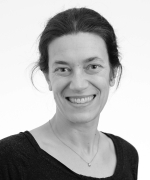About
Éva Beaujouan studies fertility and family trends in low fertility countries, and more particularly the trend towards later fertility.
She has studied applied mathematics and demography at the Université Paris 1 Panthéon-Sorbonne. Hosted at INED during her Ph.D., she defended her Ph.D. thesis on "Male and female partnership and fertility trajectories after union breakup in France" in 2009. After a postdoc at the ESRC Centre for Population Change (University of Southampton), she joined the Vienna Institute of Demography (Wittgenstein Centre) in 2012 to work on trends in fertility, fertility intentions and partnership, integrating education (level, participation) to her studies.
Eva Beaujouan joined the University of Vienna in November 2020 and currently holds the position of Associate Professor at the Department of Demography. She is the Principal Investigator of the ERC-consolidator grant BIC.LATE, investigating the “Biological, Individual and Contextual Factors of Fertility Recovery” (Grant agreement ID: 101001410, Sept. 2021-Aug. 2026). She also received an FWF stand-alone project “Later Fertility in Europe” (Jan. 2019-June 2023), to study the consequences of childbearing postponement for fertility levels in low fertility countries.
Areas of Expertise
- Fertility & Family Trends
- Partnership Dynamics
- Education & Fertility
- Causes & Consequences of Later Fertility
Curriculum Vitae
Contact
Affiliation: University of Vienna E-Mail: eva.beaujouan(at)univie.ac.at
Phone: +43 1 51581-7708
Other Resources
The Wittgenstein Centre aspires to be a world leader in the advancement of demographic methods and their application to the analysis of human capital and population dynamics. In assessing the effects of these forces on long-term human well-being, we combine scientific excellence in a multidisciplinary context with relevance to a global audience. It is a collaboration among the Austrian Academy of Sciences (ÖAW), the International Institute for Applied Systems Analysis (IIASA) and the University of Vienna.

